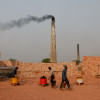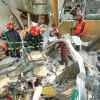Curbing air pollution should be our top priority

We condemn the lack of government action to address the country's poor air quality, which emerged as the worst in the world last year. Reportedly, Bangladesh's air was 15 times worse than the minimum set by the World Health Organization. According to the World Air Quality Report 2023, Bangladesh recorded an annual average PM2.5 concentration of 79.9 µg/m3—the highest in the world. PM2.5, or particulate matter 2.5, refers to fine particles or droplets in the air that are 2.5 microns or less in width. It has been linked to asthma, heart and lung disease, cancer, and other respiratory illnesses.
Dhaka's PM2.5 concentration in 2023 increased over 20 percent from that of 2022. Moreover, in 2023, there were four months where the monthly concentration averages were above 100 µg/m3 and two months where the average breached 150 µg/m3. This ranked Dhaka second-worst among all capital cities. The key sources of air pollution in Bangladesh are brick kilns, vehicle emissions, dust, emissions from factories, household cookstoves, plastic incineration, and unlined landfills. And even though experts have been warning that the air quality situation, which has been worsening gradually, deserves urgent attention, the authorities have done little about it. For example, in 2019, the environment ministry made a plan to phase out clay bricks by 2025. However, the government then decided to revise the plan, opting to push back the target to 2028. Additionally, in August 2023, the government decided not to put a cap on the economic life of buses at 20 years and trucks at 25 years, thus legalising older, rundown vehicles.
All this shows how little priority the government has been giving towards improving air quality. Air pollution is the greatest environmental threat to human health, according to the WHO, as it causes an estimated one in every nine deaths worldwide and is responsible for an estimated seven million premature deaths globally every year. A World Bank study estimates that 78,000-88,000 air pollution-related deaths happen in Bangladesh every year. Moreover, it is responsible for about 20 percent of total premature deaths in the country. These are catastrophic numbers.
We, therefore, urge the government to declare air pollution a national emergency and take all measures necessary to urgently address it. It is unacceptable that such a silent killer has been allowed to rise to such heights.


 For all latest news, follow The Daily Star's Google News channel.
For all latest news, follow The Daily Star's Google News channel. 










Comments